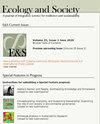加州在适应气候变化、土地利用和水资源供应方面的权衡
IF 3.2
2区 社会学
Q1 ECOLOGY
引用次数: 0
摘要
土地利用和土地覆盖、水系统和气候的变化有着千丝万缕的联系,它们的综合压力在全球许多地区产生了严重影响。综合适应规划可以通过帮助机构在区域到地方范围内管理土地和水资源来支持适应能力。这些压力源之间的联系意味着规划者经常面临潜在的权衡,如何将社会和环境的可持续性结合起来仍然是一个关键问题。我们在加州中央海岸探索这些问题,该地区已经经历了严重的水资源短缺、住房短缺、多年生农业的快速扩张,以及预计将随着气候变化而变得更严重的严重干旱。土地利用变化(土地利用和碳+水模拟器[LUCAS-W])、水资源(LUCAS-W)和气候(流域特征模型[BCM])相关联的模型产生了270米分辨率的区域变化暴露预测。我们与区域利益相关者合作,制定了一个包含九项脆弱性措施的矩阵,以评估对这些变化的关键敏感性。每项脆弱性测量都将三个暴露预测中的一个与代表三个敏感社区(农业、家庭或生态)之一的空间数据集相结合。我们评估了区域规划者正在考虑的五种土地利用和水资源管理战略情景如何提供制度上的、自上而下的适应能力,以及这些社区的可持续发展目标是否存在权衡。我们发现,具体的土地和水资源管理策略可以大大降低区域脆弱性,特别是将水资源开采限制在可持续水平的计划。最引人注目的权衡是在水需求上限策略(增加了栖息地丧失的风险)和生态系统保护策略(增加了水的脆弱性)之间。然而,权衡通常是有限的和空间本地化的,这表明我们评估的策略的局部定制可以减少它们。在暴露类别(土地利用vs水vs气候变化)而不是敏感性类别(农业vs家庭vs生态社区)中,权衡更为频繁,这表明自然资源管理有双赢的机会。我们的脆弱性地图可以为当地适应规划的优先次序提供信息。本文章由计算机程序翻译,如有差异,请以英文原文为准。
Trade-offs in adapting to changes in climate, land use, and water availability in California
Changes in land use and land cover, water systems, and climate are inextricably linked, and their combined stresses have had severe impacts in many regions worldwide. Integrated adaptation planning can support adaptive capacity by helping institutions manage land and water resources at regional to local scales. Linkages between these stressors mean that planners are often faced with potential trade-offs, and how to couple social and environmental sustainability remains a key question. We explore these questions in California’s Central Coast, a region that is already experiencing serious water shortages, housing shortages, rapid expansion of perennial agriculture, and severe droughts that are projected to become worse with climate change. Linked models of land use change (the Land Use and Carbon + Water Simulator [LUCAS-W]), water resources (LUCAS-W), and climate (the Basin Characterization Model [BCM]) produced forecasts of exposure to regional changes at 270-m resolution. We worked with regional stakeholders to develop a matrix of nine vulnerability measures that assessed key sensitivities to these changes. Each vulnerability measure combined one of the three exposure projections with spatial datasets representing one of three sensitivity communities (agricultural, domestic, or ecological). We assessed how five scenarios of land-use and water management strategies under consideration by regional planners could provide institutional, top-down adaptive capacity, and whether there were trade-offs in sustainable development goals for these communities. We found that specific land and water management strategies could greatly reduce regional vulnerability, particularly programs to cap water extractions to sustainable levels. The most dramatic trade-off was between the strategy of water demand caps that increased risk of habitat loss and ecosystem preservation that increased water vulnerability. However, trade-offs were usually limited and spatially localized, suggesting local tailoring of the strategies we assessed could reduce them. Trade-offs were more frequent across exposure classes (land use vs. water vs. climate changes) rather than sensitivity classes (agricultural vs. domestic vs. ecological communities), suggesting win-win opportunities for natural resource management. Our vulnerability maps can inform prioritization efforts for local adaptation planning.
求助全文
通过发布文献求助,成功后即可免费获取论文全文。
去求助
来源期刊

Ecology and Society
环境科学-生态学
CiteScore
6.20
自引率
4.90%
发文量
109
审稿时长
3 months
期刊介绍:
Ecology and Society is an electronic, peer-reviewed, multi-disciplinary journal devoted to the rapid dissemination of current research. Manuscript submission, peer review, and publication are all handled on the Internet. Software developed for the journal automates all clerical steps during peer review, facilitates a double-blind peer review process, and allows authors and editors to follow the progress of peer review on the Internet. As articles are accepted, they are published in an "Issue in Progress." At four month intervals the Issue-in-Progress is declared a New Issue, and subscribers receive the Table of Contents of the issue via email. Our turn-around time (submission to publication) averages around 350 days.
We encourage publication of special features. Special features are comprised of a set of manuscripts that address a single theme, and include an introductory and summary manuscript. The individual contributions are published in regular issues, and the special feature manuscripts are linked through a table of contents and announced on the journal''s main page.
The journal seeks papers that are novel, integrative and written in a way that is accessible to a wide audience that includes an array of disciplines from the natural sciences, social sciences, and the humanities concerned with the relationship between society and the life-supporting ecosystems on which human wellbeing ultimately depends.
 求助内容:
求助内容: 应助结果提醒方式:
应助结果提醒方式:


